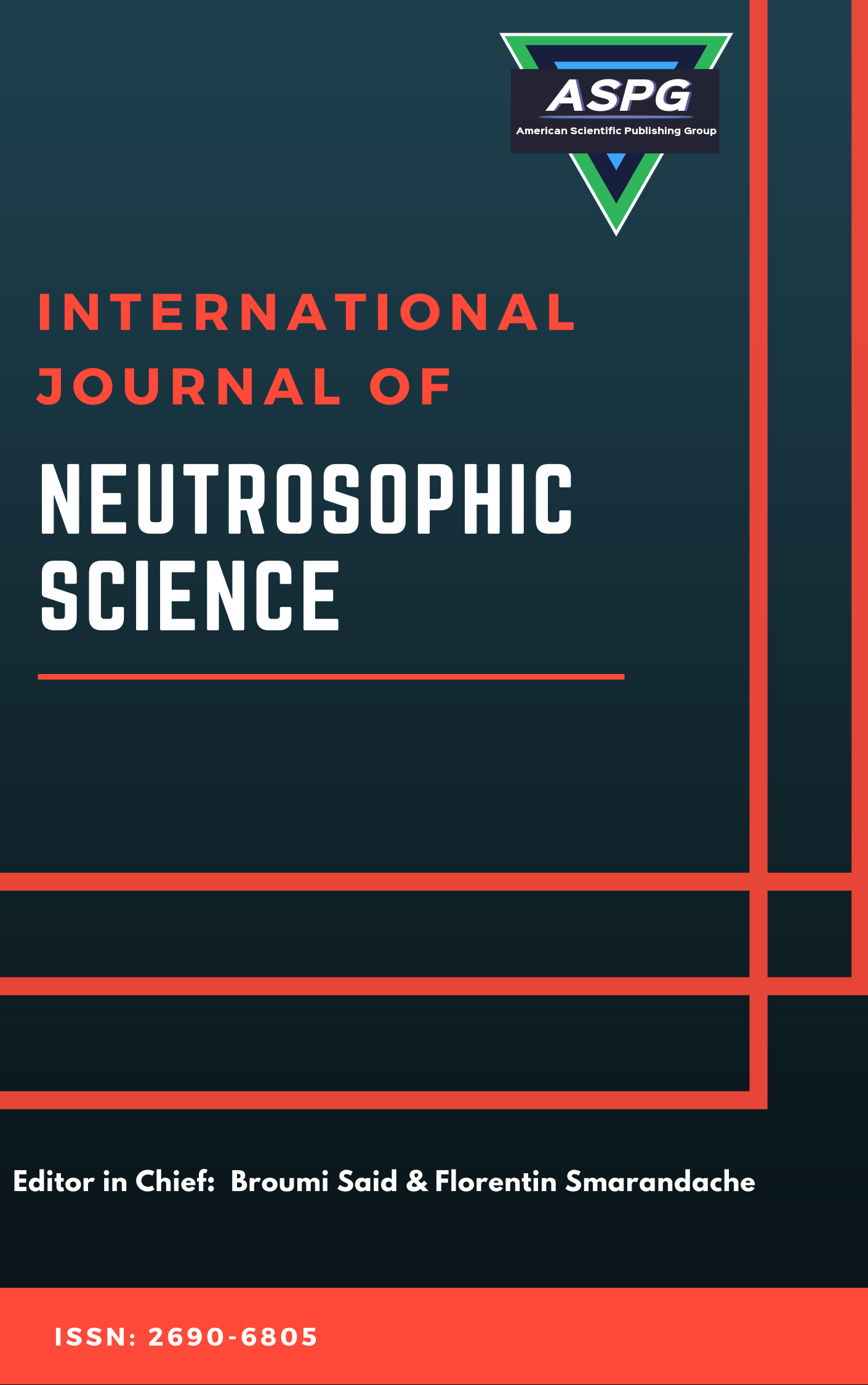

Volume 27 , Issue 1 , PP: 246-259, 2026 | Cite this article as | XML | Html | PDF | Full Length Article
Sasiwimon Iwsakul 1 * , Ronnason Chinram 2
Doi: https://doi.org/10.54216/IJNS.270122
Classical statistical methods assume that data are precise and free from uncertainty, which may not hold in many real-world applications. Neutrosophic statistics provides a flexible framework for handling indeterminacy, vagueness, and inconsistency in data. In this paper, we propose a new formulation of one-way analysis of variance (ANOVA) within the neutrosophic framework. The method treats membership, indeterminacy, and non-membership components separately, with explicit F -tests for each, and employs a maximum-based decision rule to determine significance. We also compare the proposed method with the classical one-way ANOVA. The results demonstrate that the neutrosophic ANOVA is more sensitive in detecting group differences, particularly in cases where the classical approach yields smaller F -values and may fail to reject the null hypothesis. These findings highlight the potential of neutrosophic ANOVA as a more robust alternative to classical ANOVA for analyzing data with inherent uncertainty and indeterminacy.
Neutrosophic sets , One-way analysis of variance , Group means , Decision-making
[1] A. Kharal, A neutrosophic multicriteria decision making method, New Mathematics and Natural Com putation, Vol. 10, no. 2, pp. 143-162 , 2014. https://doi.org/10.1142/S1793005714500070
[2] A. Q. Ansari, R. Biswas, S. Aggarwal, Proposal for applicability of neutrosophic set theory in medical AI, International Journal of Computer Applications, Vol. 27, no. 5, pp. 5-11, 2011.https://doi.org/10.5120/3299-4505
[3] A. Meyer-Baese, V. Schmid, Chapter 9 - Neuro-Fuzzy Classification, in Pattern Recognition and Signal Analysis in Medical Imaging, 2nd ed., Academic Press, pp. 291-323, 2014. https://doi.org/10.1016/C2012-0-00347-X
[4] M. Aslam, Neutrosophic analysis of variance: application to university students. Complex & Intelligent Systems, Vol. 5, no. 4, pp. 403–407, 2019. https://doi.org/10.1007/s40747-019-0107-2
[5] M. Aslam, and M. Albassam, Presenting post hoc multiple comparison tests under neutrosophic statistics, Journal of King Saud University-Science, Vol. 32, no. 6, pp. 2728–2732, 2020. https://doi.org/10.1016/j.jksus.2020.06.008
[6] F. Smarandache, A Unifying Field in Logics. Neutrosophy: Neutrosophic Probability, Set and Logic, Rehoboth: American Research Press, 1999.
[7] F. Smarandache, Introduction to Neutrosophic Statistics, Sitech and Education Publishing, 2014. http://fs.unm.edu/NeutrosophicStatistics.pdf
[8] M. Aslam, A. Kharal, and F. Smarandache, ”Neutrosophic decision-making framework for healthcare applications,” Neutrosophic Sets and Systems, vol. 50, no. 1, pp. 1-15, 2023. https://doi.org/10.5281/zenodo.6426358
[9] J. K. Gupta and R. Kumar, ”Neutrosophic optimization techniques for resource allocation in smart cities,” International Journal of Intelligent Systems, vol. 39, no. 3, pp. 1205-1220, 2022. https://doi.org/10.1002/int.22789
[10] B. Krishnamurthy, Comprehensive Survey of Recent Applications of Q-Neutrosophic Soft Set in Medical Diagnosis System. In “New Trends in Neutrosophic Theory and Applications,” Vol. III, Biblio Publishing, Grandview Heights, OH, United States of America, 2024. https://doi.org/10.5281/zenodo.12514381
[11] S. Broumi, D. Mamoni, B. Abdellah, B. Assia, Medical diagnosis problems based on neutrosophics sets and their hybridsStructures: a survey, Neutrosophic Sets and Systems, Vol. 49, no. 1, pp. 1-18, 2022. https://doi.org/10.5281/zenodo.6426357
[12] A. M. Alharbi, ”Enhancing machine learning models using neutrosophic logic,” Journal of King Saud University - Computer and Information Sciences, vol. 34, no. 4, pp. 1025-1033, 2022. https://doi.org/10.1016/j.jksuci.2021.03.006
[13] H. L. Yang, C. L. Zhang, Z. L. Guo, Y. Liu, X. Liao, A hybrid model of single valued neutrosophic sets and rough sets: Single valued neutrosophic rough set model, Soft Computing, Vol. 21, no. 21, pp 6253–6267, 2017. https://doi.org/10.1007/s00500-016-2356-y